The populations of my own home countries, New Zealand and Australia, are largely non-religious. In fact, New Zealand is one of the most irreligious countries in the world, especially white New Zealanders.
Despite this, in 2023, Aotearoa New Zealand elected an Evangelical Christian Prime Minister. Relying on stats a decade old, in 2013, there were only 15,000 evangelical Christians in a population of 4.4 million (~0.34%).
Most people in New Zealand – especially secular people, but also probably the majority of church-going Christians –have little or no idea what the term “evangelical” means
NZ Christian Network
Although I grew up in Aotearoa New Zealand, I’ve lived in Australia for half of my adult life. Australia was recently led by an Evangelical Christian Prime Minister, Scott Morrison. For various reasons, this did not go well. Australia is only a few per cent more religious than New Zealand. A similarly tiny proportion of the Australian population identifies as Evangelical Christians. Americans are sometimes shocked to find how secular Australians are, partly because of the Hillsong Church, which is more recognised in America than it is Down Under. Of the Australians who are Christian, the vast majority are Roman Catholics.
That said, Australia’s Hillsong Church (started by immigrants from New Zealand) perfected the large, evangelical church model and exported it to America, where it thrives.
Australia’s Louis Thoreau, Marc Fennell, grew up in the Hillsong Church. He left at the earliest opportunity and now jokingly identifies as a ‘dirty heathen’. In 2023 Marc Fennell made a documentary giving Australians an insider’s look at Pentecostalism in Australia.
Here he is in interview about it at Triple R: An Inside Look at Pentecostalism in Australia.
Overseas, evangelical Christianity is going gang-busters, but in Australia, even evangelical churches are struggling to maintain their numbers. Women are leaving Hillsong at a higher proportion, suggesting that evangelical Christianity is not keeping up with women’s rights as women experience them in other daily spheres.
While Christian denominations [in Australia] are overall witnessing decline, many individual churches are moving in the opposite direction. Evangelical Churches are not confined to any single denomination but are found within and across many Christian traditions.
What the Census reveals and doesn’t reveal about Aussie religion
It would seem, then, that even in non-evangelical countries, evangelical men disproportionately seek political power.
These men keep reminding voters that their personal beliefs are just that: personal, with the subtext that we should mind our own business.
“I want to be very clear: We have a separation between politics and faith.
“People shouldn’t be selecting an MP because of their faith, and they shouldn’t not be selecting an MP because of their faith.”
My faith has been misrepresented, says new National leader
“My faith is personal to me,” said Luxon.
“It is not in itself a political agenda. I believe no religion should dictate to the state. And no politician should use the political platform they have to force their beliefs on others.
“As MPs we serve the common cause of all New Zealanders – not one religion, not one group, and not one interest.
“A person should not be elected because of their faith and nor should they be rejected because of it. Democracy thrives on diverse thinking and different world views.”
Former Air NZ boss Christopher Luxon explains his Christian faith in maiden speech
Echoing left politicians who would prefer to keep the details of their sexuality private, religious leaders feel they should be afforded the same privacy regarding their religious ideas:
“It seems it has become acceptable to stereotype those who have a Christian faith in public life as being ‘extreme’, so I will say a little about my Christian faith.”
Chris Luxon, National Party leader Christopher Luxon on why he stopped going to church
“For me, faith is personal, but the implications are social — as personal and social responsibility are at the heart of the Christian message.” […] “Australia is not a secular country. It is a free country. This is a nation where you have the freedom to follow any belief system you choose.”
Scott Morrison’s maiden speech to Parliament, 2008
New Zealand’s Prime Minister Chris Luxon has stated his anti-abortion beliefs, but insists he won’t be seeking to reverse the 2020 legalisation of abortion engineered by Labour’s Jacinda Ardern. Despite sending his children to a church known for its anti-LGBTQ views, and also donating to it, PM Luxon insisted to the public, once he decided to run for Prime Minister, that he outright rejects such bigoted views.
“I strongly believe that everyone, no matter who they are or how they identify, should be respected and free to express themselves and love who they love.”
Christopher Luxon condemns views of US Christian group he once visited

Leaders who believe they have God right behind them do make for different leaders.
“[My faith] has anchored me, given my life purpose and shaped my values – and it puts me in the context of something bigger than myself.”
National Party leader Christopher Luxon on why he stopped going to church
As was said about Scott Morrison: “it is difficult to argue with someone who believes they are superior to the confines of their own arena of debate.”
I don’t believe religious belief is a private matter once someone moves into public life.
A private matter? Well, that might be true if Luxon was a person moving into private life.
A Chris Trotter rewind – What sort of Christian is Chris Luxon?
But since it would be politically silly for Luxon to speak at length about his evangelical ideas. That’s because evangelical Christianity is the least trusted religion in New Zealand:
“BUDDHISTS MOST TRUSTED, EVANGELICALS LEAST”. Respondents to the survey awarded Buddhists the most trust (35%) and the least distrust (15%). “Evangelical Christians” attracted the least trust (21%) and the most distrust (38%). All other “religions” were in a statistically indistinguishable clump in the middle.
Are “Evangelical Christians” the least trusted of New Zealand’s “religions”?
Strategically, Luxon refuses to make his religion part of his public persona. So if we want to understand who he is, we’re left with no alternative: Let’s take a look at ideas freely expressed by evangelicals who are not seeking political power, but who are busy, well, evangelising. The evangelical American public are by far are the most reliable cohort when it comes to understanding evangelical ideas, which are really quite foreign to most New Zealanders and Australians.
Of course, we can’t paste what we know about American evangelism onto evangelism in Australasia. We can’t know for sure which parts an individual rejects and embraces, and also, American evangelicals are not the same.
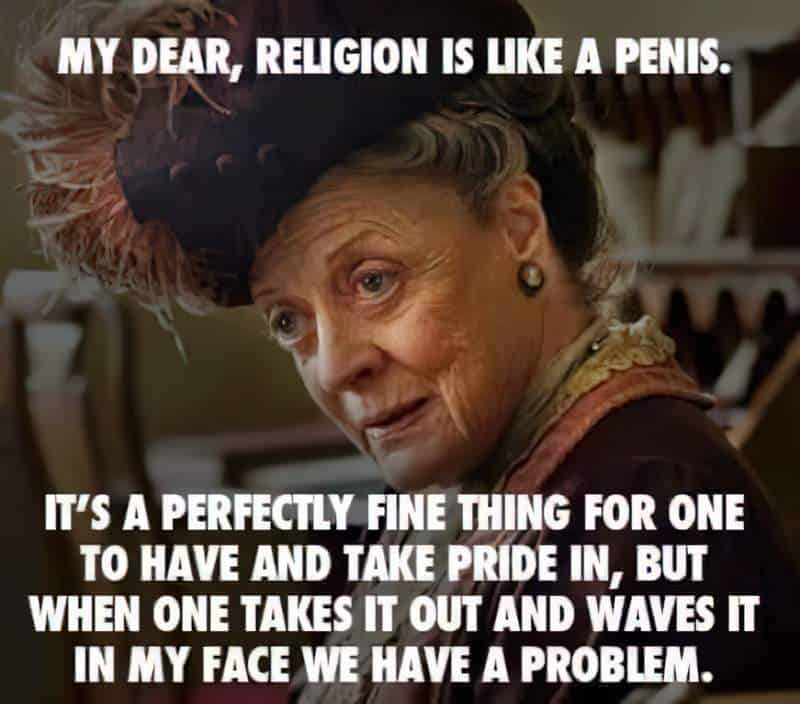
MY EVANGELICAL HIGH SCHOOL BESTIES
I’m not writing as an ex-evangelical myself, or even as a former Christian. For me, religion has never stuck. You either have spirituality in your make-up or you do not, and there’s not a darn thing you can do to change that aspect of yourself. Such is human neurodiversity.
I was required to attend Presbyterian church for part of my childhood, mainly because we were in a new town and my mother was in friend-making mode. I was bored out of my skull in Sunday School and hated to waste Sunday mornings in the only place in the world even more boring than school.
But by high school we had moved back to the city and my church-going years were behind me, so I thought. I had two best friends at the time. One was American. Her father was a Unitarian Pentecostal pastor and the family had moved to Aotearoa in the hope of introducing Kiwis into Pentecostalism. The family eventually worked out how very difficult it is to proselytise to white Kiwis, and the South Island is largely white, so they eventually moved to the North, where the majority of their church is Maori/Pasifika. We’re no longer in touch.
My other best friend, like me, had been brought up with lukewarm Christianity (in her case Methodist), but is of a different make-up and soon became Pentecostal herself. I remained tight with these friends until we went in very different directions (me to university, my friends into marriage and young motherhood).
Over the years I knew them in high school, I attended their church numerous times. I visited the big evangelical youth camp and witnessed with some horror the crap they were preaching to teenagers. My own family joked that it was just a matter of time before I would be converted myself. If they thought I was in danger of that, they’d have been worried, not jokey. They knew there was never any danger of me, the young atheist, joining my friends in their evangelical beliefs. The whole thing was baffling to me. And the more I saw, the more baffled I was. I witnessed my friend’s mother dipped in a bath. She emerged speaking gobbledy-gook, eyes closed, almost crying, hands stretched out to the ceiling. They call it ‘speaking in tongues’, and it’s not gobbledy-gook; it’s some language being channeled. If no one happens to understand it, that’s because it’s a dead language.
My missionary friend went with her family to South Africa at one point. Apparently her mother had spoken in tongues, there, too, and a South African approached her afterwards to say that she had been channeling the local dialect, and she had been praising the Lord.
I was possibly even more repelled by the anti-feminist views espoused by my besties. After attending Women’s Only sessions at the church, they truly believed that their husbands would have the final say in decisions, but, they were quick to remind me, that doesn’t men women are less than men. It just means that women are different. Different but equal. I pressed them on this because it didn’t make sense. Honestly, it still doesn’t. They looked at each other and laughed, knowingly, with each other. “She’ll never understand,” they said and we left it at that.
This reminded me of an incident that had happened some years earlier, when I was 14 years old and my friends 15. The three of us had been walking through a deserted suburban mall when my friends recognised a man from their church. The man — probably around 35 years old — did not recognise me. He looked me up and down and then gave me a lecture. “Do not let some boy pop your cherry!” he said, increasingly impassioned.
I must have looked as disgusted and baffled as I felt, because after he went on his way, my friends said to me by way of consolation, smiling to themselves, “Oh, don’t mind him. That’s just what he’s like.” I was left alone in my rage that a grown man would look at me and immediately think ‘sex’. We were still children, after all. And in case anyone here is wondering, I dressed similarly to my evangelical Christian friends did back then. We were all dressed conservatively, covered up. Baggy and full-coverage was 1990s winter fashion. Nothing in my demeanour or dress would suggest I even needed such a talking to, not that anyone deserves to be sexualised like that, no matter how they are dressed.
At university I majored in Japanese linguistics but had gone straight into second year after a gap year in Japan, so I needed a few extra papers to make enough points for a degree. I don’t know what possessed me but I chose a first year Religious Studies course. I still considered my high school friendship group my closest friendship group at this stage, and I guess I wanted to understand them better.
Nothing about studying religion via a university course brought me closer with my friendship group. It had the opposite effect.
What happened was, our Christianity lecturer was dismissed all of a sudden because it turned out she was anti-Christianity. It’s easy to judge, but this was a woman who had an evangelical background. She’d gotten a PhD in religious studies as part of her healing, I guess, and was unable to keep her distaste of Christianity out of her lectures. She was replaced mid semester by a lovely old fellow with a severe stutter who assured us we’d soon get used to it (we did). I believe he’d been brought back from retirement. But this old guy underestimated where we were at, and he assumed knowledge I just didn’t have. I don’t believe many of us had it, but it bothers me not to have a grounding in the basics before delving into the specifics. The lectures on other world religions started with the basics, but there was an assumption that New Zealanders would understand the basics of Christianity already.
So I went to my Christian friends and asked them. I had to write an essay defending either creationism or evolution, you see, and I figured if I asked my evangelical Christian friends, they’d tell me where to start with that. All through high school we’d simply avoided the topic, and I supposed that’s how we remained friends. But now I needed someone to argue against.
My peace-keeping, ever-friendly missionary-girl friend declined the invitation to get into it with me, but invited me to her house one afternoon, where she assured me her dad was far more up on this matter than she was.
Turns out he wasn’t the least up-to-date on matters of evolution. The pastor who had come to NZ to convert white people just like me wasn’t the slightest bit interested in talking about that. He knew for sure that carbon dating is bunkum because carbon dating keep changing their minds about the age of things whenever new information comes to light.
“Well, yeah? That’s how science works?”
The man did not like to be told how science works. I kept pressing him for details about how creationism seems more plausible than the Theory of Evolution.
“It’s just a theory,” I was told.
I pushed back on that, too, and I now know you can’t argue logically with someone who relies on faith. But I guess I didn’t know that then. I really annoyed this pastor. “When I was your age I read up on evolution and I came to the conclusion we were created by God. I can’t argue with you, I’m not up on the details these days.” Then he got up and walked out.
Sufficiently annoyed by the conversation myself, I was left with many points to argue against. I got an excellent mark for that essay, but at what cost?
WHAT DOES ‘EVANGELICAL’ MEAN?
“Evangelical” is a term that can have different meanings depending on the context in which it is used, but it most commonly refers to a type of Christian theology, religious tradition, or movement.
“Evangelical” means different things to different people, and those who fit an exogenous description will frequently disidentify with ‘evangelical’ to describe themselves. Instead they’ll simply tell you that they are ‘Christian’ or ‘Pentecostal’.
Evangelical does not mean ‘evangelistic’. Whereas evangelical refers to a theological category, evangelistic has negative connotations around ‘bible-bashing’.
The United States has the largest proportion of evangelicals in the world. American evangelicals are a quarter of the USA population and its single largest religious group.
The most basic definition
‘Evangelical’ denotes churches which uphold orthodox doctrine, and who preach and practise this faith.
Prominent evangelical denominations include Baptists, Pentecostals, and various non-denominational congregations.
‘Evangelical’ comes from the word ‘evangel’, which means ‘good news’. Evangel is basically an old term for ‘Christian gospel’.
Features of evangelical Christianity
Evangelicalism is actually very difficult to define. There’s a well-known definition by David W. Bebbington which is based on a British version of Evangelicalism from a particular point in history. This has four characteristics:
- Biblicism: Evangelicals often place a strong emphasis on the Bible as the ultimate and inerrant source of religious guidance and doctrine. They believe that the Bible is the Word of God and should be the central authority in matters of faith and practice.
- Crucicentrism: a focus on the atoning work of Christ on the cross
- Conversionism: Evangelicals believe in the necessity of a personal, transformative experience of faith in Jesus Christ. This experience is often referred to as being “born again” or “saved.”
- Activism: Evangelicals are known for their commitment to evangelism, which involves actively sharing the Christian message and seeking to bring others to faith in Jesus. This can take the form of missionary work, outreach programs, or personal conversations.
But there are also differences in worship styles. Evangelical worship practices can vary, but they often include contemporary music, heartfelt prayers, and sermons that focus on practical application of biblical teachings.
When it comes to American Evangelicalism, historian George Marsden is the expert.
Too often, Evangelicals define themselves not by who they are, but by who they are not. This comes from culture war mentality. They perceive other groups are out to get them. Many groups operate in a toxically, warring tribal way. It’s very difficult to uphold a message of love and peace when this culture war is going on.
DIFFERENT TYPES OF CHRISTIAN EVANGELICALISM
Dr Constantine Campbell divides American Evangelicalism into three main types.
THEOLOGICAL EVANGELICALS
These Evangelicals have the closest ties to the origin of the term, going back 500 years to the Protestant Reformation. They believe in Jesus atoning by death for our sins. The Bible is the supreme authority in matters of life and faith.
CULTURAL EVANGELICALS
Influenced by theological Evangelicalism, these people a e caught up in the culture but not because they are especially interested in theological concerns but because they are surrounded by it. They perhaps were taken to an Evangelical church as children, or attend an Evangelical school.
POLITICAL EVANGELICALS
These people self-identify as Evangelical but really they have a set of beliefs which sit on the right of politics. They’re passionate about abortion and sometimes about protecting gun rights. They are anti-immigration, anti LGBTQ+, and are intent on getting conservatives onto the Supreme Court bench.
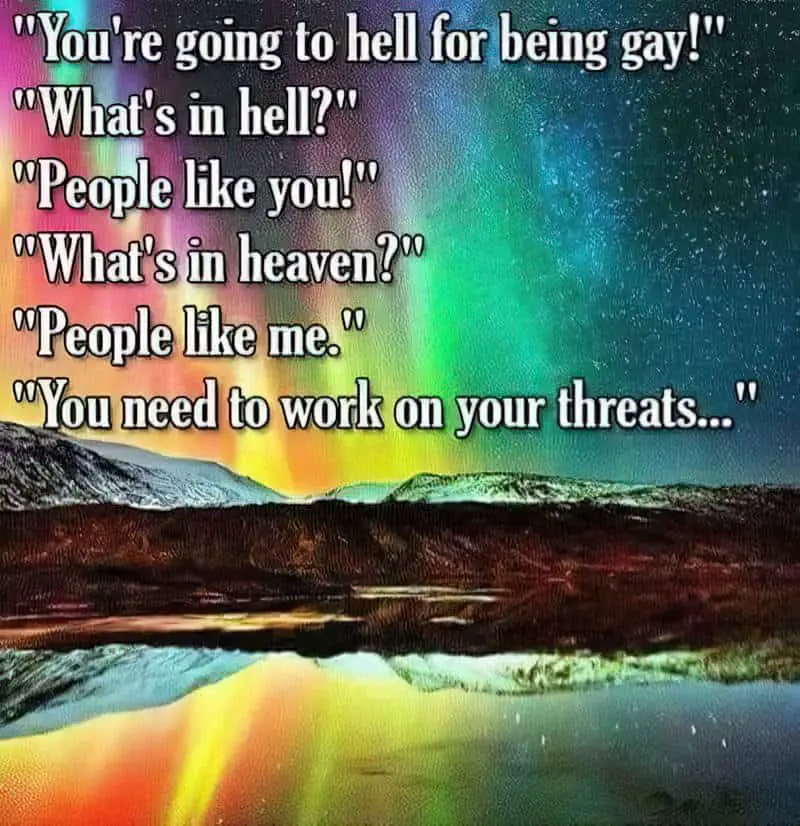
Political evangelicals may have a handle on scripture only insofar as it helps them politically. Alternatively, they may never have studied let alone read the Bible. They will frequently claim that their own ideas are supported by scripture.
THINGS POLITICAL EVANGELICALS SAY IS IN THE BIBLE BUT WHICH ARE ABSOLUTELY NOT IN THE BIBLE (a.k.a. “the goat herder’s guide to the galaxy”)
- Life starts at conception. In fact, the Bible says life begins at first breath. Abortion and miscarriage is mentioned ten times in the Bible, but is mostly descriptive, or instructions on how to perform abortion. The only prohibition against abortion in the Bible concerns men who terminate women’s pregnancies against the will of women. (Book of Isiah.)
- By the way, Jesus was neither capitalist nor Republican nor knew anything about modern USA politics.
- The right to bear arms (The Romans are the villains in that particular story)
- God helps those who help themselves. (The Bible does not promote toxic individualism — that’s a feature of late capitalism. This phrase may come from Aesop, popularised by Benjamin Franklin. It is in the Qur’an 13:11.)
- Condemnation of homosexuality and transgender. The phrase “Man shall not lay with man” was originally “man shall not lay with boy”. The passage cautioned against paedoph!lia, not gay sex between consenting adults. The passage is found in Romans, and was translated to “homosexual” for the first time in the 1940s. To be more precise, the original doesn’t literally translate to “boy” but is actually two words. No one is 100% sure if it’s meaning but contextually, the first word seems to imply an aggressor of some sort. The second word is sometimes translated “effeminate”, and was often used to describe men who shaved their faces or who didn’t wear beards. Many scholars agree that the Bible is referring to some sort of sexual abuse either with minors or with household servants as a show of dominance. So it would seem that passage in Romans is cautioning us against sexual activity which is used to dominate others.
- Spare the rod, spoil the child is not in the Bible anywhere.
- That people in the Old Testament are Christians (there were no Christians until Jesus!)
- The Saints are not in the Bible. Some of them come from Roman and Greek gods, with the same names and responsibilities.
- That God never gives you more than you can handle
- Some people commonly think the words of other historical figures are also included in the Bible: Shakespeare, Benjamin Franklin, Dante, Milton. “An eye for an eye” comes from Shakespeare, for example. This phrase is also misinterpreted from Shakespeare, meaning you’re justified in harming someone else if they harm you first. Instead it’s a cautionary tale about not going completely over the top in your retribution. In the Bible, people are encouraged instead to turn the other cheek, avoiding retributive acts entirely.
- The deadly sins are not mentioned
- Prayer in the Bible is not a public spectacle but a very private relationship with God.
- Saul never changed his name to Paul after his encounter with Jesus on the road to Damascus
- Trinity is never mentioned, though Evangelicals will often argue that the trinity is a cornerstone of faith.
- Cleanliness is next to Godliness. Never mentioned.
- “Love the sinner, hate the sin.” Not in the Bible.
- Some people think Christmas trees are in the Bible, and will be very annoyed if establishments put up decorations other than the tree, with the mistaken belief that decorated trees are in the Bible but other decorations are not. It was either Estonians or Latvians who started the Christmas tree tradition.
- Mention of Rapture and a 7 year great tribulation
- A white Jesus
- Mary was not a virgin in the modern sense of virgin. This was a mistranslation by the King James translators. Nowhere does it say “No sex before marriage.)
- Concrete descriptions and levels of Hell (cf. Dante et al)
- “Forgive and forget” is nowhere in the Bible. This is toxic advice. Unconditional love is not in the Bible.
- Satan/the Devil is not a ‘fallen angel’. Angels that look like humans are also not a Biblical thing.
- God is not described as a human-like figure with human anatomy. This idea comes from the phrase “man in his image” but there’s no physical description of God in the Bible to indicate any human characteristics.
- There’s the story of the woman who was going to be stoned. Jesus said, “Let the one without sin cast the first stone.” That was actually added after the compilation of the Bible
- Noah’s Ark having two of every kind of animal. It was two of every unclean animal, and seven of the clean (kosher) animals.
An Evangelical person might belong to two or even to all three groups, but if they belong to none they’re not Evangelical in any meaningful sense.
In Australia, Evangelicals see themselves as quite different from their American counterparts. However the media uses the term will affect how the general public uses the word. Meaning is determined by usage. ‘Evangelical’ no longer means what it used to mean.
A BRIEF HISTORY OF POLITICAL EVANGELICALS IN THE UNITED STATES
It was Jimmy Carter in the 1970s who popularised the term “born-again Christian”. Today, Jimmy Carter is remembered fondly.
Then Ronald Reagan came along to lead America through the 1980s. Now Christians saw a masculine version of conservatism. Evangelicals, with families and churches led by men, shifted their support from Carter to Regan. Arguably, Reagan wasn’t a Christian, let alone an Evangelical Christian. But he presented himself as a Strongman who was going to make America great again. He pushed for political outcomes that Evangelicals cared about.
This marked an important shift. Political Evangelicals are now less interested in the characters who seek political power so long as they can get their desired outcomes. They don’t care how that’s done, even if it’s brute political force.
Political evangelicals say things like, “Well, we don’t live in a theocracy. We don’t even expect politicians to be Christians. Therefore we may as well just get the person who will get things done.”
Leadership is not restricted to what you achieve. It is about character, because leaders shape culture. Ironically, this is what Evangelicals railed against during the Clinton administration. Because they didn’t want a Democrat, they argued that Clinton (due to his well-known adultery) did not have the character required to lead a country and a culture. But when it comes to politicians ostensibly fighting for the same conservative things, suddenly personality doesn’t matter to them.
Fast-forward to Trump, many times more immoral than Clinton, with not a shred of shame around any of his shortcomings. Political Evangelicals abandon morality in the naked pursuit of power, regardless of who brings it. The same people who claimed Clinton was a terrible man in the 1990s are singing the praises of Trump. Political power is not a Christian value. Seizing political power and enforcing political power on the wider culture is not in the New Testament at all.
JESUS V. EVANGELICALS BY CONSTANTINE R. CAMPBELL (2023)
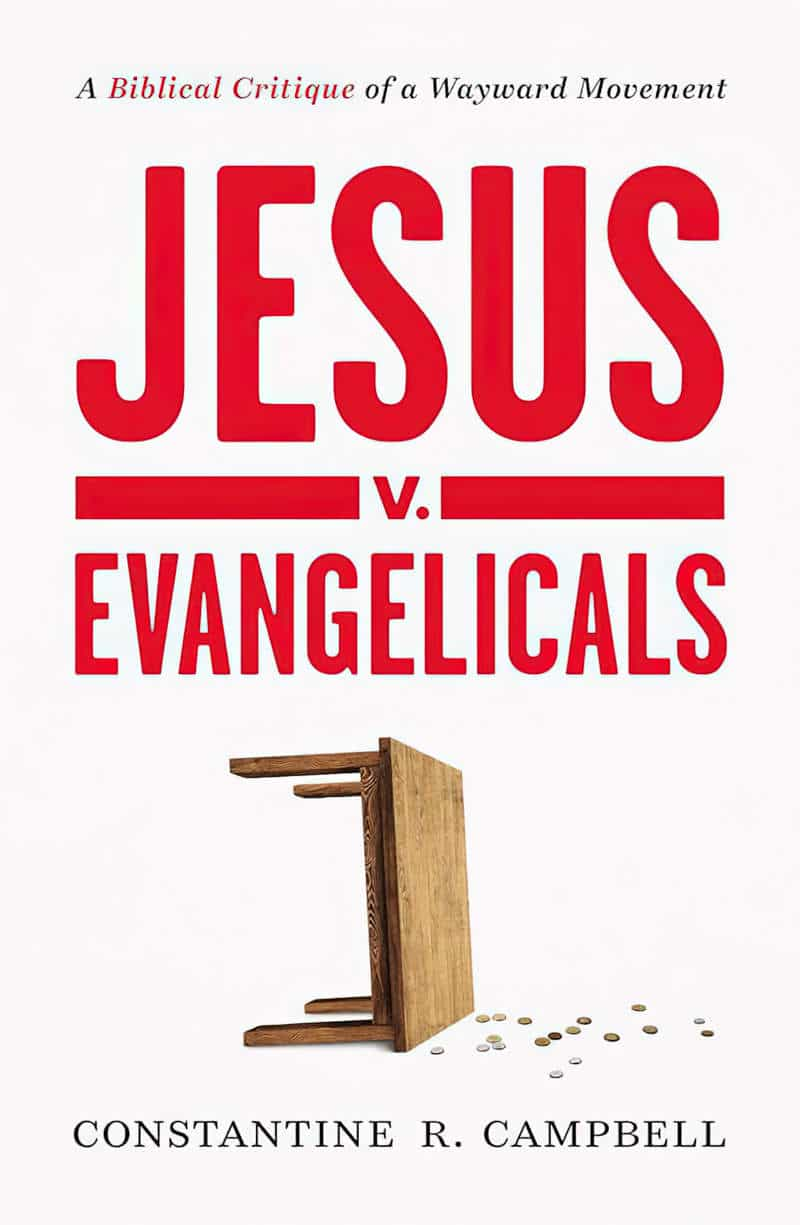
American evangelicalism is at a crisis point.
The naked grasping at political power at the expense of moral credibility has revealed a movement in disarray. Evangelicals are now faced with a quandary: will they double-down and continue along this perilous path, or will they stop, reflect, and change course And while support of Donald Trump has produced the tipping point of the evangelical crisis, it is not by any means its only problem.
Evangelicals claim the Bible as the supreme authority in matters of faith. But in reality, it is particular readings of the Bible that govern evangelical faith. Some evangelical readings of the Bible can be highly selective. They distort the Bible’s teaching in crucial ways and often lead evangelicals to misguided attempts to relate to the world around them. Many Christians who once self-professed as “evangelicals” can no longer use the term of themselves because of what it has come to represent power-mongering, divisiveness, judgementalism, hypocrisy, pride, greed. Some leave not just evangelicalism but Christianity for good.
Jesus v. Evangelicals is an insider’s critique of the evangelical movement according to its own rules. Since evangelicals regard themselves governed by the Bible, biblical scholar Constantine Campbell engages the Bible to critique evangelicals and to call out the problems within the contemporary evangelical movement. By revealing evangelical distortions of the Bible, this book seeks to restore the dignity of the Christian faith and to renew public interest in Jesus, while calling evangelicals back to his teaching. Constantine Campbell appeals to evangelicals to break free from the grid that has distorted their understanding of the Bible and to restore public respect for Christianity in spite of its misrepresentations by the evangelical church.
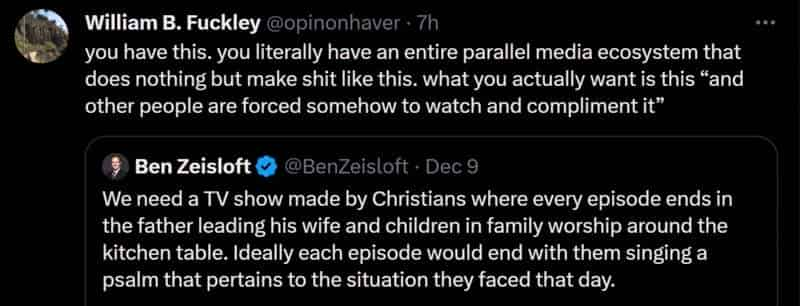
THE MEANING OF ‘FUNDAMENTALISM’
Originally this was quite a healthy term, meaning Christians who focused on the fundamentals of faith.
But the word now describes anti-intellectual Christians with politically very conservative views which are not keeping step with social progress in the broader culture. “Fundies” read the Bible in a literalistic way e.g. six-day creation.
120 years ago Fundamentalist meant something different. In the 1940s they realised they had a branding problem. Fundamentalists changed the word to Evangelical. But because of the euphemism treadmill, this needs changing again. They will probably eventually rebrand and start to call themselves something else.
IMPORTANT EVANGELICAL CHRISTIAN CONCEPTS
These concepts may be foreign to the rest of us, but since a disproportionate number of Evangelical men seek political power, it’s very much worth us understanding who we’re voting for.
“ACCEPTABLE SINS” AND FORGIVENESS
How non-evangelicals process forgiveness tends to look a little different.
(Un)acceptable sins become acceptable because the culture treats them that way. And people learn how to behave from the culture around them.
Pride, bullying, arrogance — we are told these things are sinful but, so often, Evangelical Christian culture says differently.
American Evangelical churches have been slow to act with leaders who are well-known bullies. These people eventually become too toxic to remain in power and everything falls down around them, but it takes years to get rid of them. It took seven years for the eviction of Pastor Mark Driscoll after the first formal complaint from his elders.
Church people look at a charismatic male leader and will wave away things like adultery — absolutely acceptable in anyone else — so long as that leader is expanding the church, or if his ‘gifts’ are believed to compensate for his deficiencies.
This is a complete abuse of what the Bible really has to say about forgiveness. Leaders in the Bible are without exception gentle and merciful. When they forgive people for their sins, they are saying, “You’re welcome to follow us.” These Biblical leaders are not saying anything goes in some complex moral calculation in which other things can ‘make up for’ gross behaviour.
When Jesus came into contact with gross people he did not extend kindness and mercy to them. He used the word ‘vipers’ to describe people like Pastor Mark Driscoll. Jesus is not a fan of pride at all. His message requires humility, otherwise that whole way of living doesn’t work. A prideful person is literally unable to repent because they don’t think they’re doing anything wrong.
In this sense, belief means trust in — and allegiance to — someone other than yourself. Pride is the most Biblical sin, talked about at length all throughout the Bible. God hates the proud. Very strong language.
It’s a mistake to think that “all sin is sin”. Not all sins are equal, actually, but the idea that “all sin is equally bad” excuses some very bad behaviour indeed.
In Evangelical culture, there is a list of acceptable sins that it’s okay to confess and to talk about. For example, “I am too materialistic. I bought this thing yesterday and I didn’t really need it.” Or, “Sometimes I get irritated by my wife.”
But there are other sins which are surrounded by a culture of silence, and these are simply not talked about. For example, if you’re having an affair with your secretary — or worse — you’d keep that to yourself. There’s very little real support for church members dealing with the genuinely difficult and very damaging stuff.
Doubt is another unacceptable sin. (See my analysis of the film Doubt, one of my favourites.)
God says you can come to him with all your sins. That’s not the message communicated by the church. Even though it’s said verbally, the culture says something different.
A Deep Dive into Forgiveness with Everette Worthington at Our Voices podcast
SCRUPULOSITY VERSUS REPENTANCE
There’s a difference between Evangelical theology and the way people actually behave. Those two things don’t necessarily match up.
Dr Constantine Campbell talks about toxic rationalisation in which Evangelicals say things like, “Our political activity is only because we’re trying to act on some theological commitment.” However, this is not the most healthy expression of theological commitment. These people forget to embody the teaching of Jesus in their relationships with others. Evangelical ideas cannot be abstracted. You can’t be a ‘good soldier for Christ’ when the message itself encourages you to act unlike Jesus.
Dr. Laura Robinson makes this observation:
Theory: A lot of American Christianity is really good at producing scrupulosity but bad at producing repentance, and I think they are two sides of the same coin.
One thing I’ve been wondering about lately is, why do so many churches encourage thinking that fixates on being “good enough” around largely inconsequential things (clothes, dating, thinking other people are attractive), but also — when the chips are down, why does this scrupulosity so rarely translate into outrage against major offenses (abuse, infidelity, financial mismanagement?)
Why do so many of the same systems treats looking at p*rn three times a year a huge deal, but abusing a child is a minor issue that needs to be handled in house?
And I think it’s a collision of bad theological instincts around justification theory. The first part (scrupulosity) is downstream of the idea that no one is good enough for God and the natural place of humans before God is to be judged and condemned. There’s two tacks here – there are no minor sins, because all sins are major to God, and even if there were minor sins, permanent torture is still the appropriate sentence for a minor sin.
So that’s where scrupulosity comes in. But the next step (join this community, meet these norms, believe these things to solve your primary problem, which is a lack of forgiveness) is where you introduce the problem of major evils getting ignored by people in power.
I think there’s a few reasons why this happens:
1) There’s no clear theory of change for many believers that accompanies the idea of forgiveness. Your primary responsibility before God is to get absolution, not necessarily to behave differently. For a lot of rank and file members, the scrupulosity sticks around, but there aren’t a lot of theories of change beyond white-knuckling it and public disapproval.
2) The system that teaches the theology has to be shown to be effective and accurate, so acknowledging that people who buy into the system are doing horrible things creates a problem that incentivizes covering it up rather than dealing with it. It’s useful for the system to encourage people to publicly perform scrupulosity, but it’s less useful to have real disasters occur within view of all attendees.
This is how I think we’ve ended up in a weird situation where a church can have men on staff who describe themselves as addicts and go to weekly meetings if they even rarely look at pictures of a naked woman, but if one of those same men rapes a woman the church is reluctant to react at the same level.
Dr. Laura Robinson on Twitter/X
PURITY
The Cult of Purity Rings from Sounds Like A Cult podcast
See also: What Does Modesty Mean?
TOTAL-REALITY MOTHERHOOD
“Total-reality Motherhood” is not a phrase that comes from within Evangelical circles, but is a term coined by Judith Warner which applies increasingly to Western motherhood, but which I feel applies on steroids to Evangelical Christian communities, in which a woman is really only useful insofar as she is a mother.
it’s the cultural notion that motherhood is supposed to constitute your entire life’s work, with all other aspects of your identity sacrificed on the altar of 360-degree parenting. It seems this pernicious ideology began in the 1990s but reached fever pitch at the turn of the millennium. These days it afflicts my generation through bastardised, social media filtered versions of attachment theory and gentle parenting philosophies. To quote one article: “Now mothers were always to be ‘on’, engaged in relationships with their children that were at once kinesthetic, tirelessly management oriented, and unrelenting in their emotional solicitations.”
I’ve stopped trying to be the perfect mum, and it’s a huge relief
Rhiannon Lucy Cosslett
“DYING TO YOURSELF”
One of the hardest parts about de-converting out from under a fundagelical marriage was unlearning my indoctrination and re-learning all the rules for how men and women should interact. One of those ideas I had to unlearn was the idea of “dying to yourself.” But it was the one I needed to unlearn the most.
“Dying to yourself” in Christian theology means (generally, as much as any bit of Christianese can be said to mean any one thing) to shove your own needs and desires deep down and ignore them while working to do the best you can to serve your god.
Captain Cassidy, Only Sky: The Unequally Yoked Club: As I Lay Dying (To Myself).
SEVEN MOUNTAINS IDEOLOGY
Seven Mountains Ideology refers to the idea that the church should control the seven mountains of society.
- Media
- Government
- Education
- Economy
- Religion
- Art and entertainment
- Family

THE FAMILY BY JEFF SHARLET
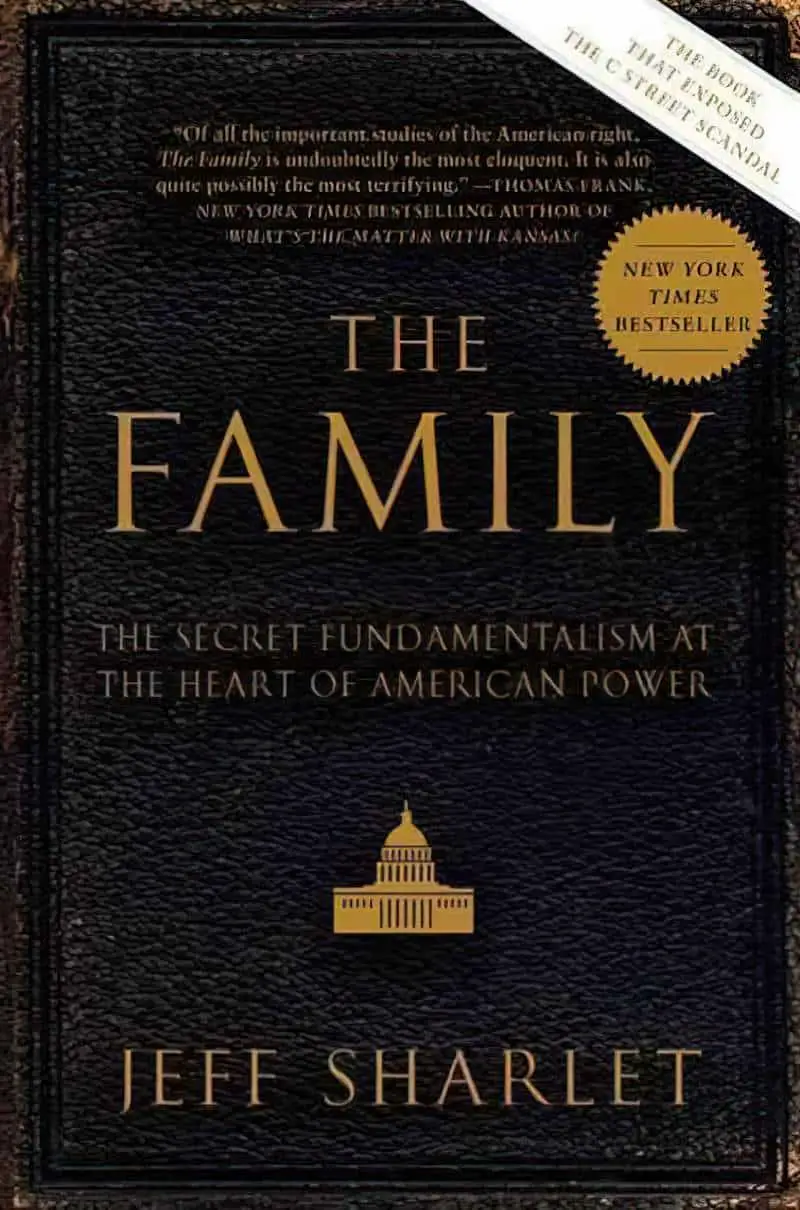
They insist they are just a group of friends, yet they funnel millions of dollars through tax-free corporations. They claim to disdain politics, but congressmen of both parties describe them as the most influential religious organization in Washington. They say they are not Christians, but simply believers.
Behind the scenes at every National Prayer Breakfast since 1953 has been the Family, an elite network dedicated to a religion of power for the powerful. Their goal is “Jesus plus nothing”. Their method is backroom diplomacy. The Family is the startling story of how their faith – part free-market fundamentalism, part imperial ambition – has come to be interwoven with the affairs of nations around the world.
DARK MONEY BY JANE MAYER
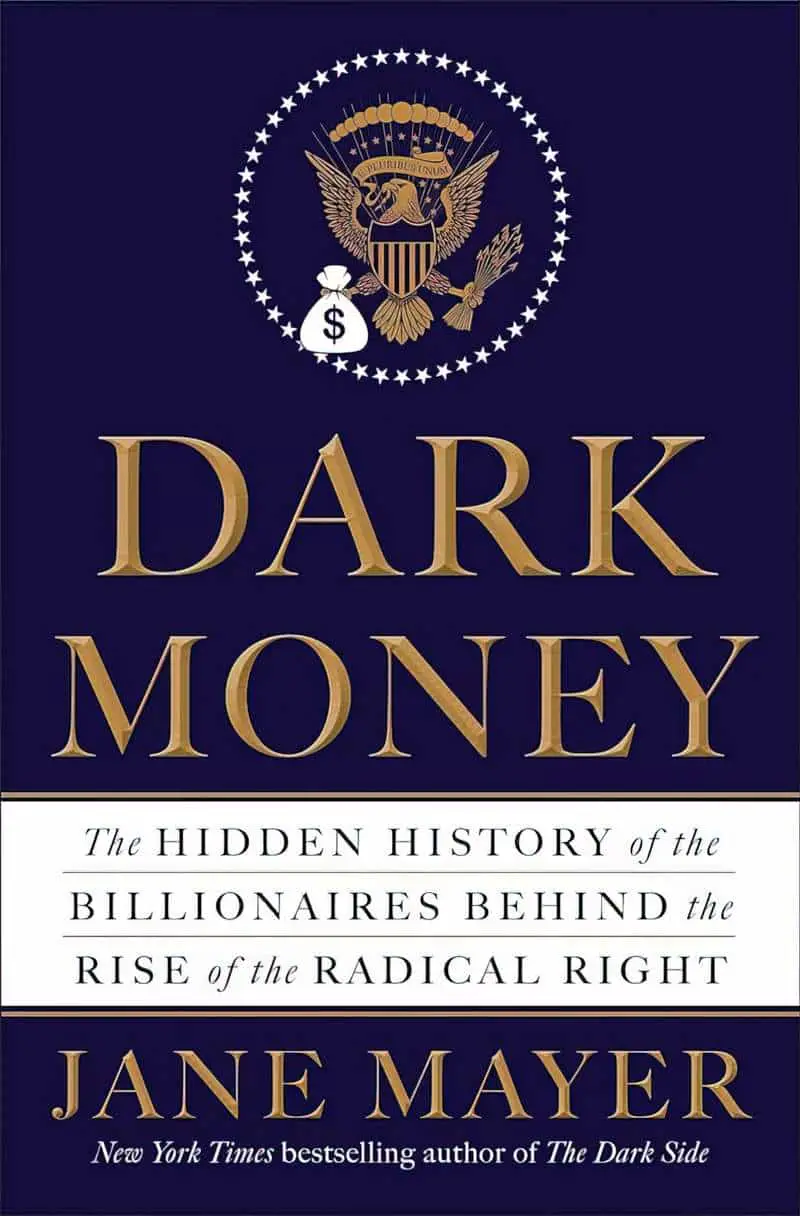
Why is America living in an age of profound economic inequality? Why, despite the desperate need to address climate change, have even modest environmental efforts been defeated again and again? Why have protections for employees been decimated? Why do hedge-fund billionaires pay a far lower tax rate than middle-class workers?
The conventional answer is that a popular uprising against “big government” led to the rise of a broad-based conservative movement. But as Jane Mayer shows in this powerful, meticulously reported history, a network of exceedingly wealthy people with extreme libertarian views also played a key role by bankrolling a systematic, step-by-step plan to fundamentally alter the American political system.
The network has brought together some of the richest people on the planet, foremost among them Charles and David Koch. Their core beliefs – that taxes are a form of tyranny; that government oversight of business is an assault on freedom – are sincerely held. But these beliefs also advance their personal and corporate interests: Many of their companies have run afoul of federal pollution, worker safety, securities, and tax laws.
Jane Mayer spent five years conducting hundreds of interviews – including with several sources within the network – and scoured public records, private papers, and court proceedings in reporting this book. In a taut and utterly convincing narrative, she traces the byzantine trail of the billions of dollars spent by the network and provides vivid portraits of the colorful figures behind the new American oligarchy.


AMERICAN CRUSADE BY ANDREW L. SEIDEL
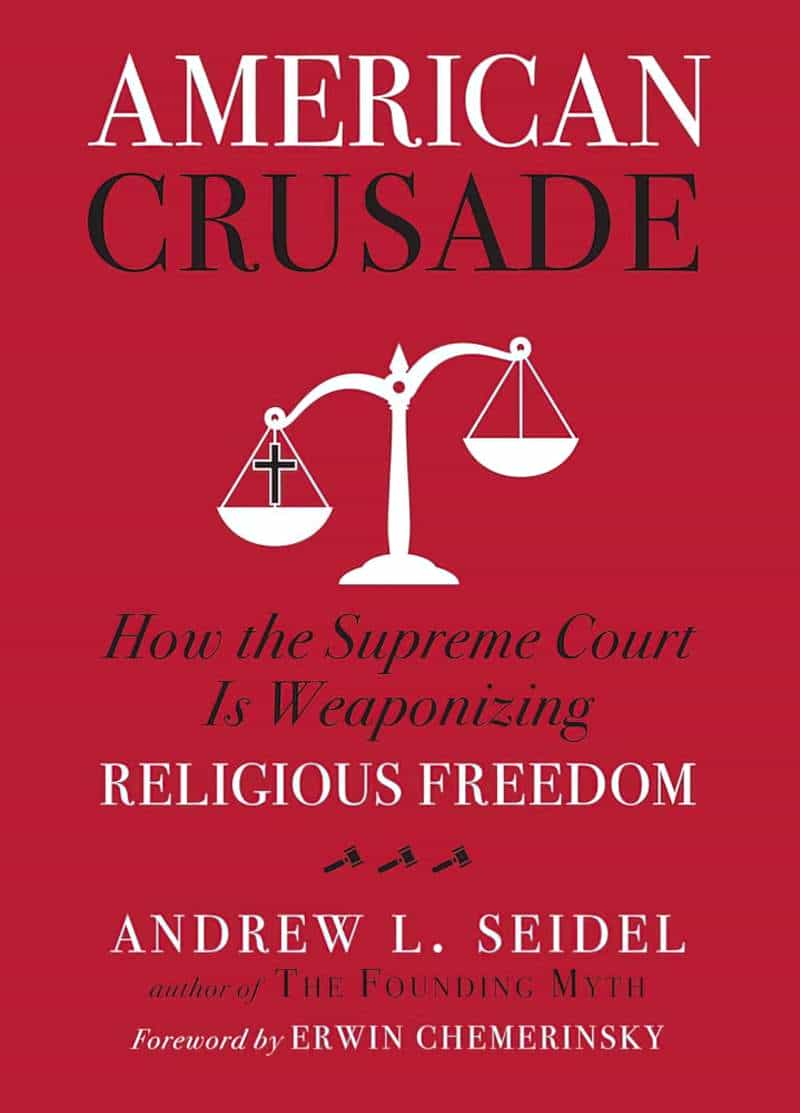
Is a fight against equality and for privilege a fight for religious supremacy? Andrew L. Seidel, a constitutional attorney and author of the critically acclaimed book The Founding Myth: Why Christian Nationalism Is Un-American, dives into the debate on religious liberty, the modern attempt to weaponize religious freedom, and the Supreme Court’s role in that “crusade.”
Seidel examines some of the key Supreme Court cases of the last thirty years—including Masterpiece Cakeshop v. Colorado Civil Rights Commission (a bakery that refused to make a wedding cake for a gay couple), Trump v. Hawaii (the anti-Muslim travel ban case), American Legion v. American Humanist Association (related to a group
maintaining a 40-foot Christian cross on government-owned land), and Tandon v. Newsom (a Santa Clara Bible group exempted from Covid health restrictions), as well as the recent overturning of Roe v. Wade—and how a hallowed legal protection, freedom of religion, has been turned into a tool to advance privilege and impose religion on others. This is a meticulously researched and deeply insightful account of our political landscape with a foreword provided by noted constitutional scholar Erwin Chemerinsky, author of The Case Against the Supreme Court.
TAKEOVER BY NOAH FELDMAN
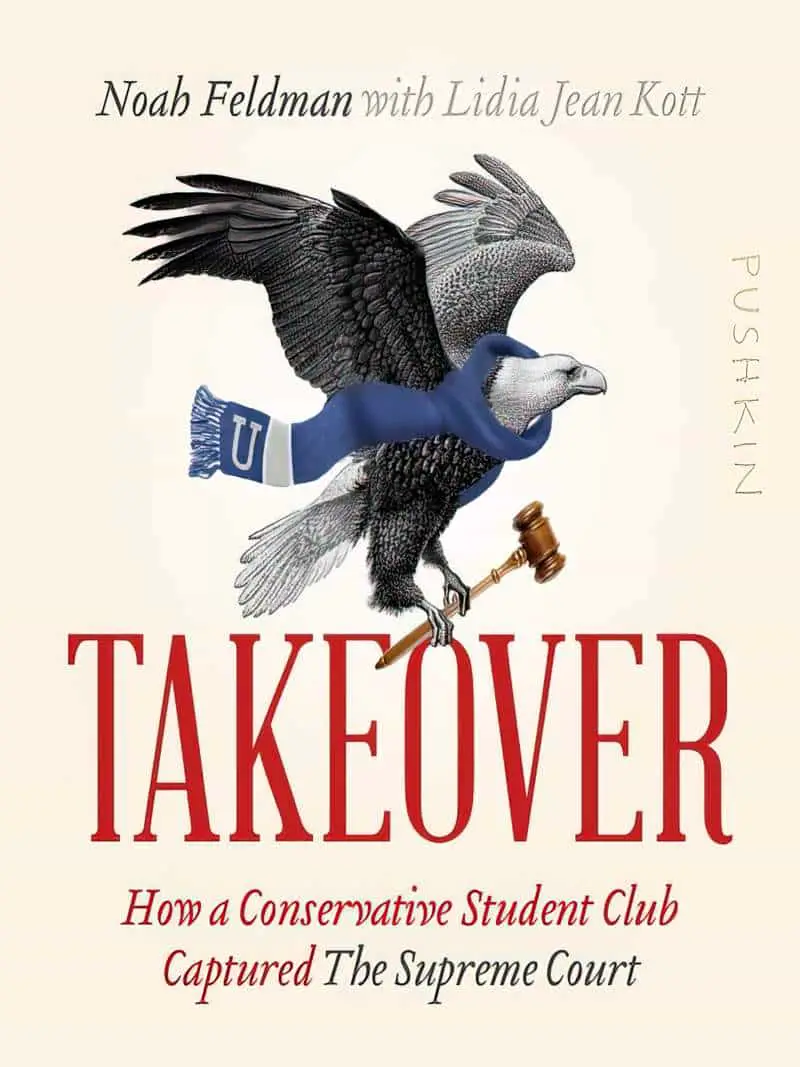
Six of the nine sitting justices of the Supreme Court are current or former members of The Federalist Society – a private, conservative legal organization which has grown to dominate modern American jurisprudence.
Takeover tells the story of how The Federalist Society started as a student club and grew to become the most influential legal organization in US history. Over the last three decades, they managed to shape judicial policy and secure numerous seats for its members on courts of appeals and the Supreme Court. Now at the height of its prominence, the organization faces new challenges and internal divisions threaten to splinter the group as its members debate the core founding principles of the Federalist Society.
Author and narrator Noah Feldman, a constitutional law professor at Harvard, host of the Deep Background podcast, and author of several books including The Arab Winter and The Three Lives of James Madison, provides special insight and access into this organization. He takes listeners into the offices and chambers of the people who know the Federalist Society best and illuminates how the group came to power, the challenges it faces, and its future which should matter to everyone.
WHAT DOES EVANGELICAL INTOLERANCE LOOK LIKE?
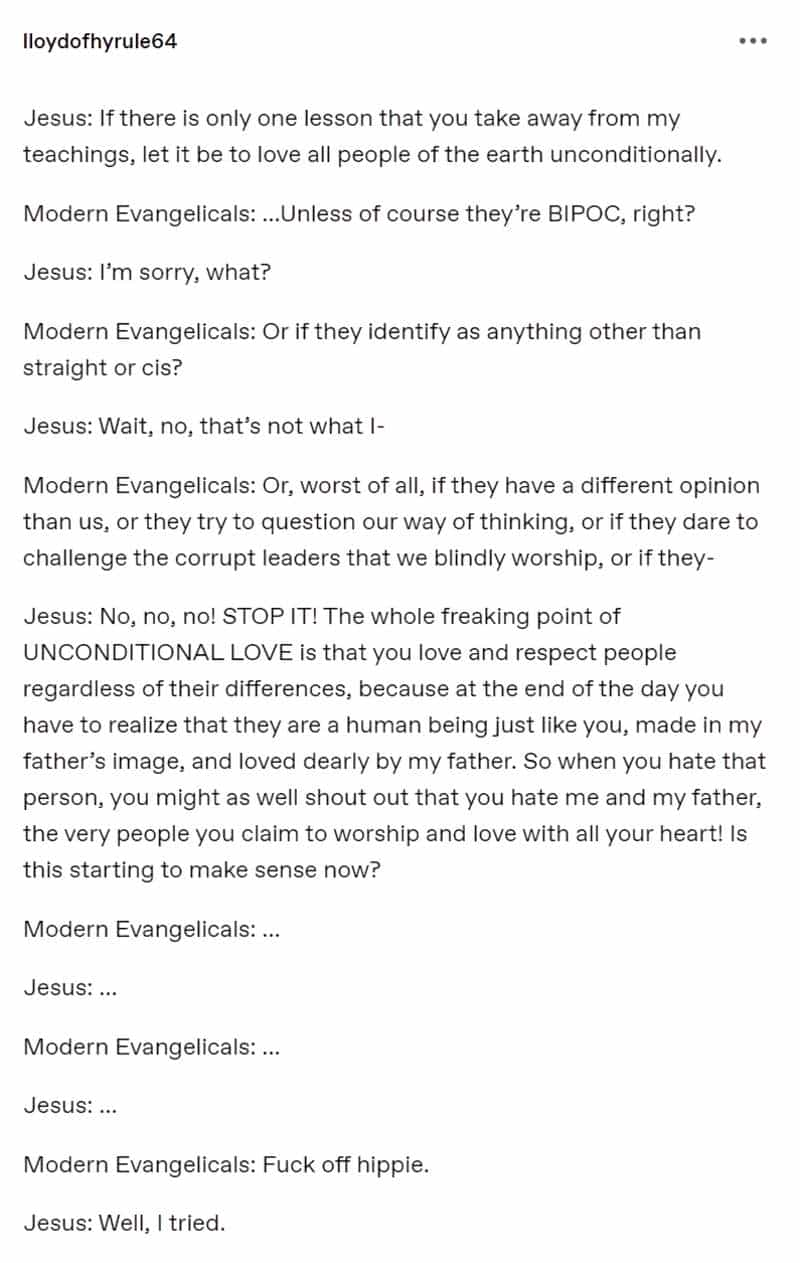
MEN ARE MEN, WOMEN ARE WOMEN
Evangelical Christians are gender essentialists, rejecting a social constructionist view of gender. There is no tolerance for transgender and genderqueer individuals.
Demonstrably untrue. The gender binary never was, and now the sex binary is truly dead among scientists:
- Binary sex is scientifically insufficient
- Scientists need account for sex complexity
- We propose a new conceptual framework
- Measuring sex at multiple levels using diverse organisms is critical.
- This will result in better science.
‘Voluntarism’ is the philosophical notion that human will drives identification with marginalised identities based on fashion, trends and so on. By this view, queer adults can turn children queer simply by visibilising their own lives.
BLAME FOR EXISTENCE
The trans body – particularly the trans woman – is viewed as a threat simply because its very existence breaks the norms of a heterosexuality and cisgender culture. In order to interpret and give voice to the discomfort that arises from the break in norms, it must be sexualized.
Like evangelical purity culture, the breaking of the norm is externalized, blame put upon the person who was just existing, and not on the person who received their mere existence as a sexual affront (think cishet men telling women to cover up because it gave them a boner).
This interplay of social norms and bodies that break those norms is why you should closely examining the language used in high profile instances like this. The trans woman – if there even was one, there’s little evidence to that – was not “flashing” people.
The trans woman was actually following the norms of the spa and the person who sexualized her nude body is violating her (she allegedly *tried to film the woman*). But because the trans woman’s body is sexualized, the reaction is justified after the fact.
The very same forces that ask a woman what she was wearing or doing after she gets raped are at play here with the trans woman whose mere existence resulted in anger and violation of her boundaries. In purity culture, the victim is always the responsible one.
So, uh, to wrap up: same old story, just with some new characters. Purity culture undergirds the current trans panic and compulsory heterosexuality is the f*cking worst.
@diannaeanderson 3:58 AM · Jul 5, 2021
ORIGEN’S REVENGE BY BRIAN PATRICK MITCHELL
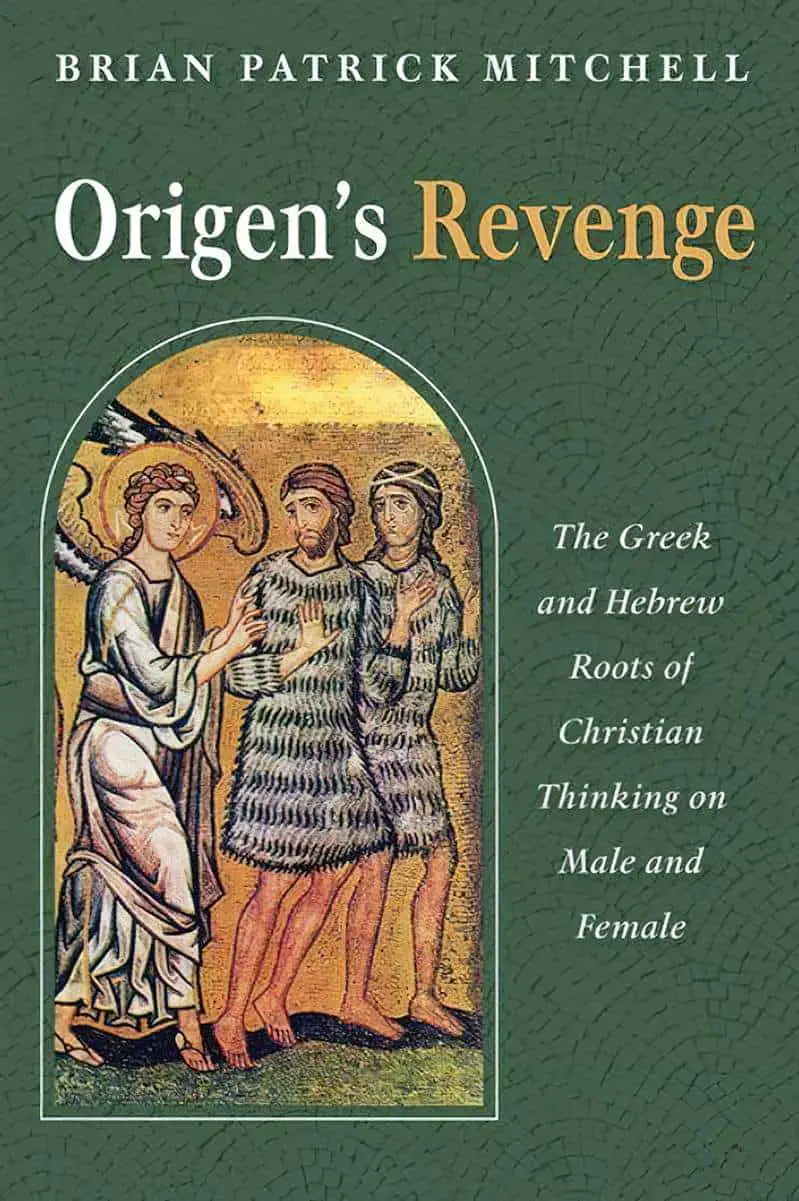
Is the difference of male and female to be “completely shaken off” so that men and women are no longer men and women but merely human beings? The great seventh-century saint Maximus the Confessor said yes, but such thinking is difficult if not impossible to reconcile with much else in Christian tradition that obliges men and women to live as either men or women.
Origen’s Revenge contrasts the two main sources of early Christian thinking on male and female: the generally negative view of Greek philosophy, limiting sexual distinction to the body and holding the body in low regard, and the much more positive view of Hebrew Scripture, in which sexual distinction and reproduction are both deemed naturally good and necessary for human existence.
These two views account for much of the controversy in early Christianity concerning marriage and monasticism. They also still contribute to current controversies over sex roles, gender identity, and sexual ethics.
Origen’s Revenge also develops the more Hebrew line of early Christian thought to propose a new understanding of male and female with a firmer grounding in scripture, tradition, theology, and philosophy and with profound implications for all human relationships, whether social, political, or spiritual.
SPARE THE ROD, SPOIL THE CHILD
Evangelical Christianity has consistently been behind what the research says about punishment and retribution when it comes to child-rearing. Parents in the church have been encouraged to ignore their own instincts and discipline their children according to very old-fashioned (abusive) notions around child development and conditioning.

We now know that abuse is only reinforcing to the abuser.
COMPULSORY (MONOGAMOUS HETEROSEXUAL) SEXUALITY

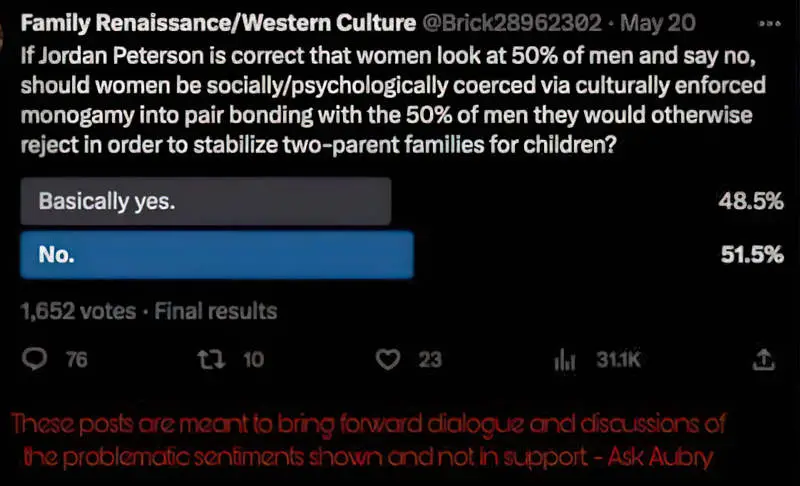
EVANGELICAL SEX NEGATIVITY
Evangelical Christianity is very concerned with controlling the family, which means the movement is extremely interested in controlling sex and reproduction. The rules are this:
- Before marriage: No sex.
- After marriage: Lots of procreative sex.


EVANGELICAL CHRISTIANITY IS A FERTILITY CULT
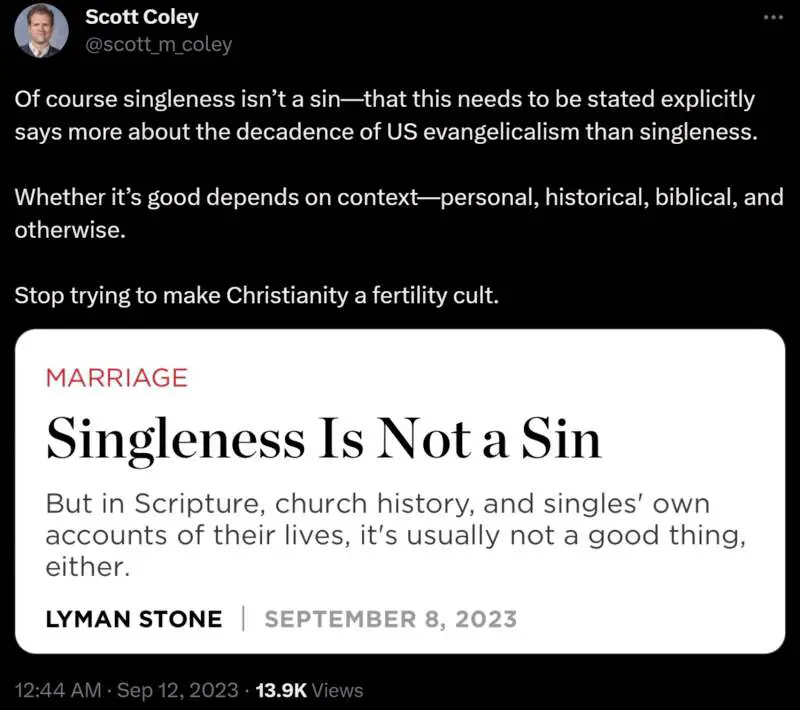
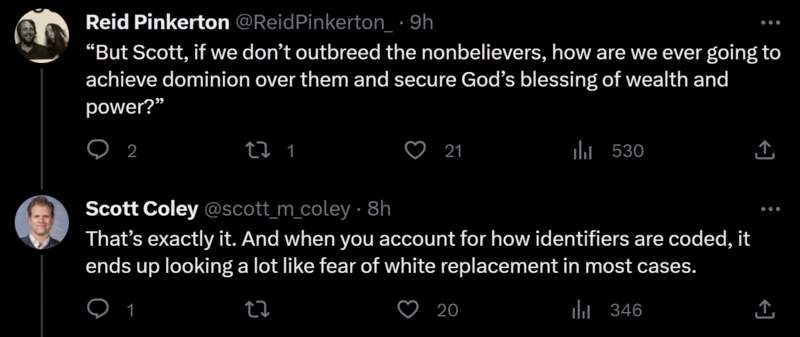
THE POSITIVITY REQUIREMENT
This one especially affects girls and women. Cheerfulness and smiling politeness is a social requirement.

THE FUTURE OF TRADITIONALISM
Twenty years ago, it seemed Traditionalism was an esoteric and irrelevant set of beliefs. Since then, powerful people sympathetic to its ideas have overturned that perception. In the US, Russia, and Brazil powerful presidential advisers have drawn on traditionalism to disastrous effect – the Trump presidency and the war in Ukraine both owe something to traditionalism. Mark Sedgwick has written Traditionalism: The Radical Project for Restoring Sacred Order (Oxford UP, 2023) and he has been thinking where Traditionalism – or post Traditionalism – goes now.
The Future of Traditionalism, A Discussion with Mark J. Sedgwick, New Books Network
THE TRAD WIFE MOVEMENT

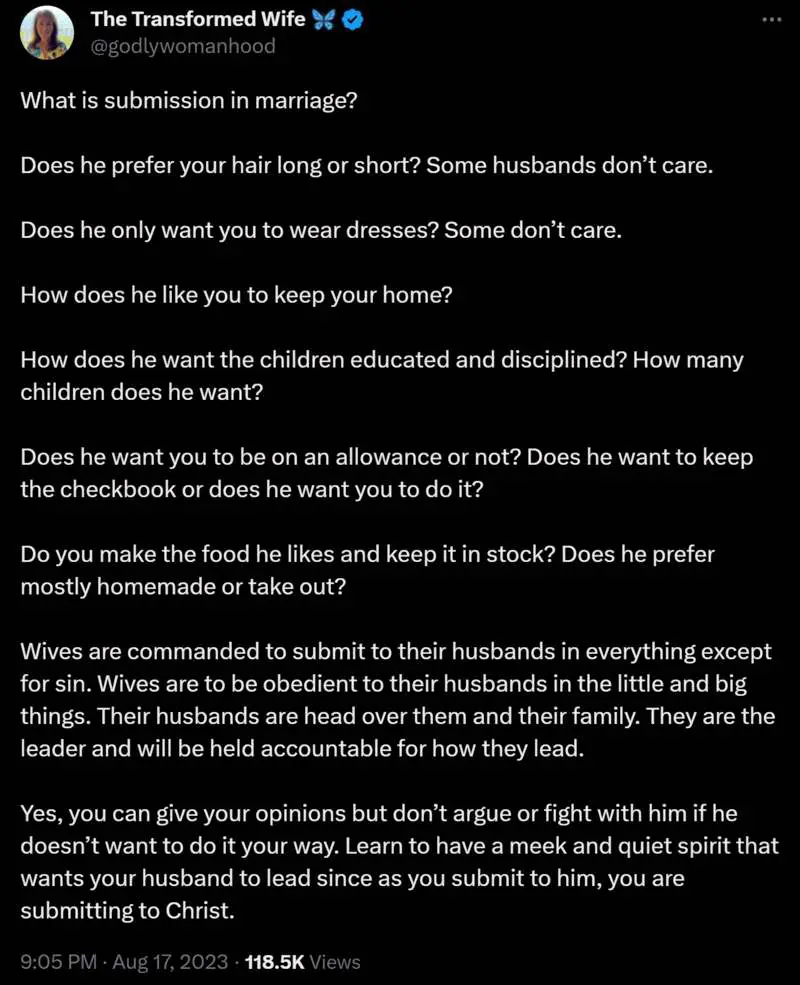

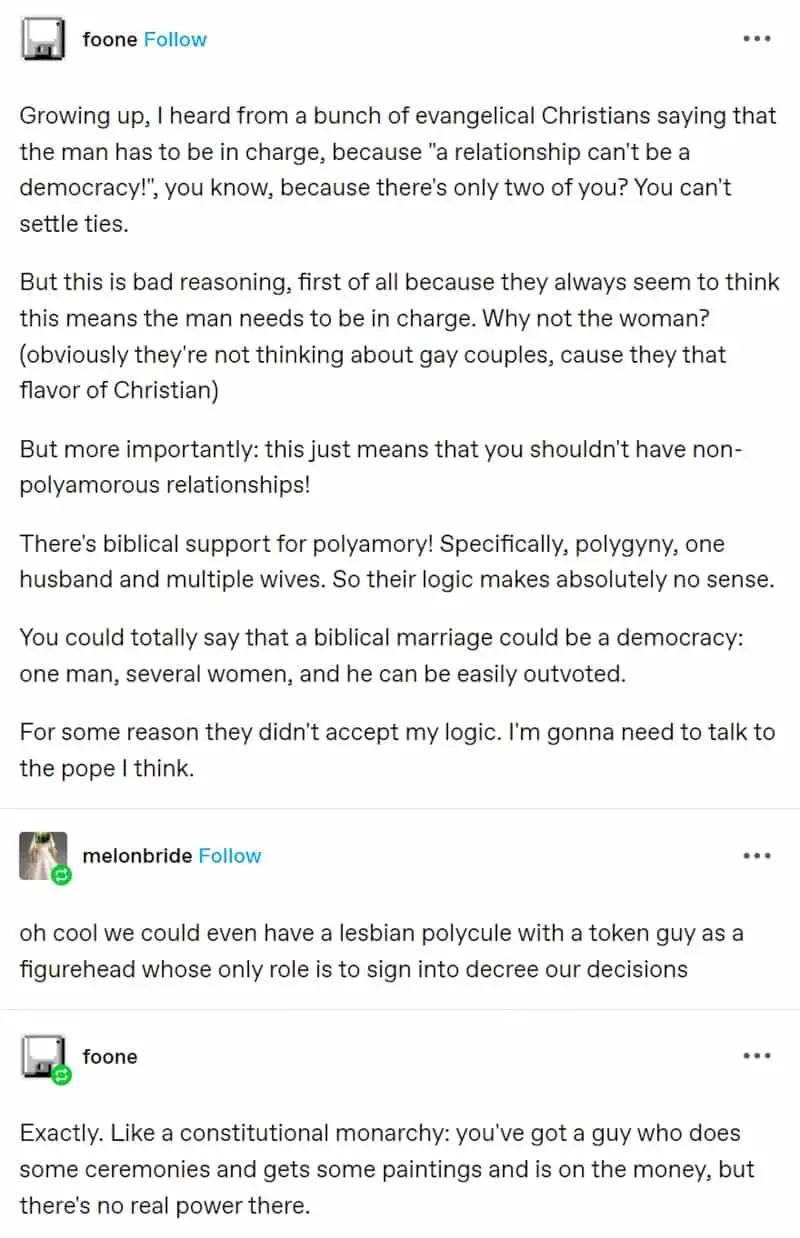
The End of Religion: Feminist Reappraisals of the State (2020)
Feminist theory has enhanced and expanded the agency, influence, status and contributions of women throughout the globe. However, feminist critical analysis has not yet examined how the assumption that religion is natural, timeless, universal and omnipresent supports sexist and race-based oppression.
Kathleen Mcphillips and Naomi Goldenberg edited volume The End of Religion: Feminist Reappraisals of the State (Routledge, 2020) proposes radical new thinking about religion in order to better comprehend and confront the systematic disempowerment of women and marginalized groups. Utilising feminist and post-colonial analysis of access, equity and violence, contributors draw on recent critical theory to collapse accepted boundaries between religion and secularity with the aim of understanding that religion is a technology of governance in its function, meaning and history. The volume includes case studies focusing on how the category of religion is deployed to perpetuate male hegemony and racist inequities in Australia, Mexico, the United States, Britain and Canada. This trenchant feminist critique and academic analysis will be of key interest to scholars and students of Religion, Sociology, Political Science and Gender Studies.
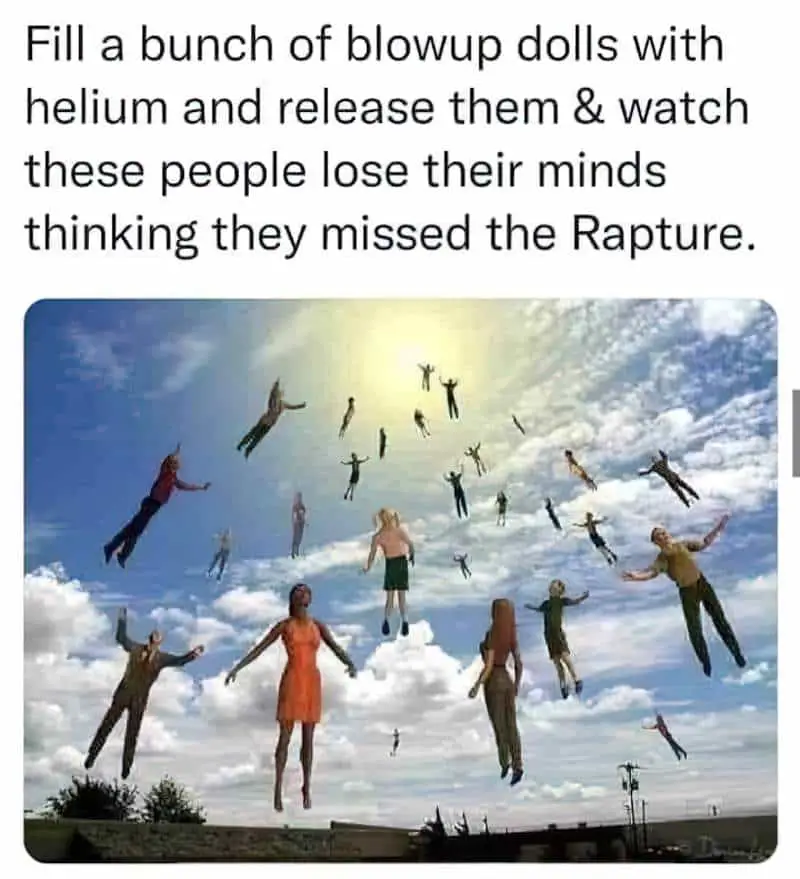
EVANGELICAL CHRISTIANS AND DINOSAURS
In the lead up to the 2023 New Zealand election there was this whole big thing about dinosaurs. Journalists kept asking Christopher Luxon whether he ‘believed in dinosaurs’. Part of the reason I’m writing this post is to dispel the idea that if you ‘believe in dinosaurs’ you must be a certain kind of person who accepts certain archaeological facts.
This chatter amplified after Dame Jacinda Ardern sent in a video endorsing Labour. (Dame Jacinda now lives in the USA.) She recorded the endorsement in her young daughter’s bedroom and the daughter happens to have a lamp in the shape of a dinosaur, which was partially on the screen. Many Kiwis believed this was Jacinda Ardern making a sly comment about Luxon’s flat-earth beliefs.
But common Evangelical ideas around dinosaurs are more complicated and nuanced than ‘if you don’t believe in dinos you’re a flat earther’.
FURTHER READING
WHAT DO PEOPLE MEAN WHEN THEY SAY ‘I BELIEVE’?
The many meanings of belief are outlined in this article by Abby Day at The Sociological Review.
I believe in anarchism like a scientist believes in evolution: it’s not faith, it’s the logical summation of my experience and available knowledge. If someone proves me wrong, if someone convinces me that law, the state, and/or capitalism are what’s best, then I suppose I’ll convert. But I believe in evolution and I believe in anarchism.
Margaret Killjoy


